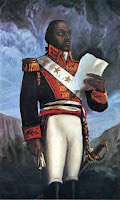Toussaint Louverture (1743 – 1803)
Toussaint Louverture was a prominent leader of the Haitian Revolution, which lasted from 1791 to 1804 and resulted in the establishment of the independent nation of Haiti. He is widely regarded as a key figure in the struggle against slavery in the Caribbean and a symbol of resistance against colonialism.
Early Life and Rise to Power:
Toussaint Louverture was born in Saint-Domingue (modern-day Haiti) in 1743, the son of an enslaved African father and a free African mother. He grew up in slavery, but his exceptional intelligence and leadership skills were quickly recognized by his owners, who allowed him to receive an education and eventually gain his freedom.
In the late 1770s and early 1780s, Toussaint became involved in the growing movement for Haitian independence. He joined forces with other rebel leaders and fought against the French colonial government and the slave-owning plantation owners. Toussaint quickly distinguished himself as a skilled military strategist and a charismatic leader, and he rose through the ranks of the rebel army to become one of its most important commanders.
The Haitian Revolution:
In 1791, Toussaint and his followers launched a full-scale rebellion against the French government in Haiti. The revolution quickly spread throughout the island, and by 1793, Toussaint had established himself as the de facto ruler of the newly-formed Haitian Republic. He declared himself Governor-General for life and established a government that was based on the principles of equality, freedom, and justice.
Under Toussaint's leadership, the Haitian army defeated several attempts by the French to reassert their control over the island. He also negotiated a treaty with the British, who had been attempting to invade Haiti, that allowed him to maintain his position as Governor-General while also gaining British support.
Later Years and Death:
Toussaint's leadership and vision helped to shape the Haitian Republic and laid the foundation for the country's future development. However, his rule was not without controversy. He was accused by some of his fellow Haitian leaders of being too authoritarian and of aligning too closely with the colonial powers.
In 1802, Napoleon Bonaparte, the leader of France, sent an army to Haiti with the intention of restoring French control over the island. Toussaint initially attempted to negotiate with the French, but he was eventually betrayed and arrested. He was sent to France, where he was imprisoned and died in 1803.
Legacy:
Toussaint Louverture is remembered today as one of the most important figures in Haitian history and in the history of the African diaspora. His leadership during the Haitian Revolution inspired countless others to fight against slavery and colonialism, and his vision for a free and just society continues to inspire people around the world.
His legacy can be seen in the many monuments and memorials that have been erected in his honor, as well as in the continued struggle for human rights and social justice in Haiti and beyond. Despite the challenges that Haiti has faced in the centuries since Toussaint's death, his legacy serves as a reminder of the power of resistance and the possibility of building a better world.















No comments